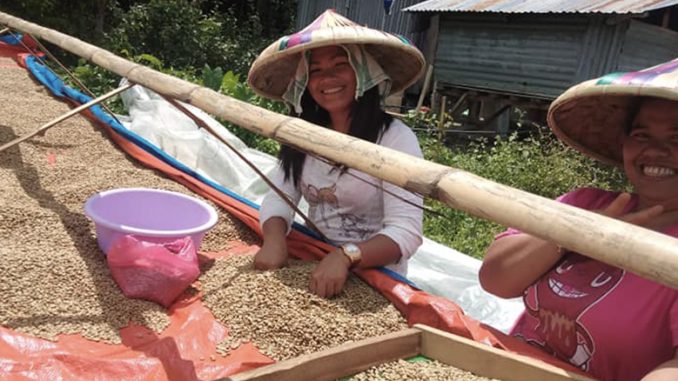
Kalsada Coffee and Sinag Coffee are giving the Philippines’ coffee growers the tools they need to push through COVID-19, climate hazards, and more.
BY EMILY JOY MENESES
SPECIAL TO BARISTA MAGAZINE ONLINE
Cover photo courtesy of Paul Bañas
To conclude our series on coffee in the Philippines, we spoke with Kalsada Coffee and Sinag Coffee—two companies dedicated to empowering the country’s coffee producers. In the wake of COVID-19 and the increasingly severe effects of climate change, the Philippines’ coffee farmers need support now more than ever. Read on to learn how Kalsada and Sinag are working to address their biggest challenges.
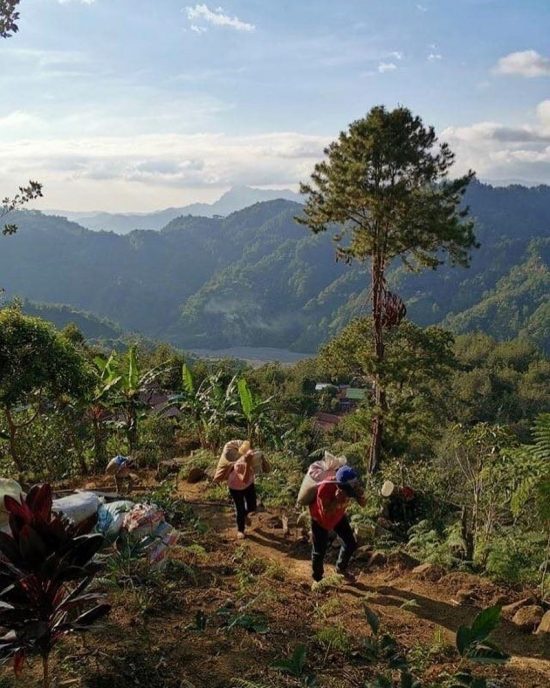
Kalsada Coffee
In Tagalog, the word kalsada means “road”—and that’s exactly what Carmel Laurino (she/her) intended her company, Kalsada Coffee, to be: a road that would connect the Philippines’ coffee farmers with consumers around the world. Born in the Philippines and raised in the Pacific Northwest, Carmel’s journey into the coffee world began when she stumbled across an old photograph during her undergraduate research. This intriguing image, which depicted a company selling Philippine coffee at Seattle’s Pike Place Market in 1909, led her to take a deep dive into her native country’s coffee culture.
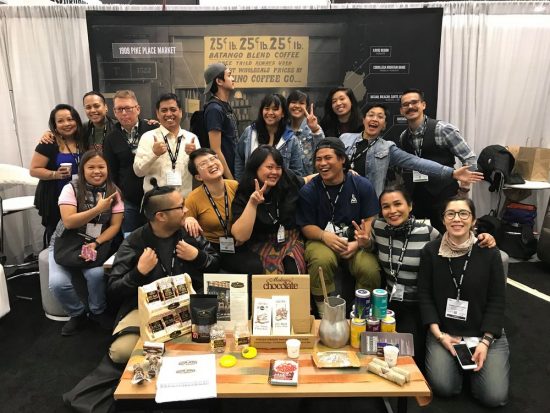
After meeting a number of coffee farmers, Carmel realized that there was an infinite well of potential—not just for Philippine coffee itself, but for the country’s farmers to create profitable and sustainable businesses that could be passed throughout the generations. Eventually, she went on to create Kalsada: a coffee company dedicated to supporting the Philippines’ coffee growers and their efforts to cultivate quality coffee.
Though steadfast in their mission to empower coffee producers, Kalsada has faced a series of ongoing challenges; typhoons, in particular, pose a serious threat to the company’s partner farmers. On average, the Philippines is hit with roughly 20 typhoons per year, and Corazon Padilla (she/her), Kalsada’s international relationships coordinator, shared with us the impact of Typhoon Ulysses.
The Category 4-equivalent typhoon struck the Philippines in November of 2020, right when Kalsada’s coffee farmers were in full harvest season. The storm’s strong winds and unrelenting rainfall damaged a large portion of their coffee trees, and the extremely wet conditions forced the team to adapt in a variety of ways: including putting most of their coffee through a washed process. “Adapting is never ideal,” Corazon stated, “but we’re glad that we’re all safe and still able to offer bright, clean coffees this year.”
Kalsada Coffee’s resilient approach to Typhoon Ulysses is a reflection of their staunch dedication to their farmers. Even when faced with adversity, the team has kept moving forward, helping farmers and their families to grow in both their professional and personal lives.
“The most important thing for us is building trust and partnership with the local community and farmers, listening to their input and concerns, and finding ways to help them succeed,” Corazon stated. “They know what they need and what they’re capable of achieving—and we’re here to provide them with tools. To the Philippines’ farmers, coffee has always been primarily a secondary crop … but the rise of specialty coffee is changing that. Farmers now have an opportunity to showcase their ability to produce high-quality coffees, while also earning a fair income and (being given) appropriate recognition as skilled professionals. It helps cultivate a sense of pride and encourages other farmers to turn towards specialty coffee as well.”
Sinag Coffee
Located in Calapan City, Oriental Mindoro, Sinag Coffee is a micro-roastery with an ethos reflective of its name. Tagalog for “ray of sunlight,” the word sinag symbolizes the company’s dedication to securing a brighter future for their farmers, particularly for the Mangyan community, Mindoro’s indigenous people. The roastery places a strong emphasis on highlighting local, ethical, traceable, and sustainable coffee—something they believe that all roasting companies, big and small, should advocate for.
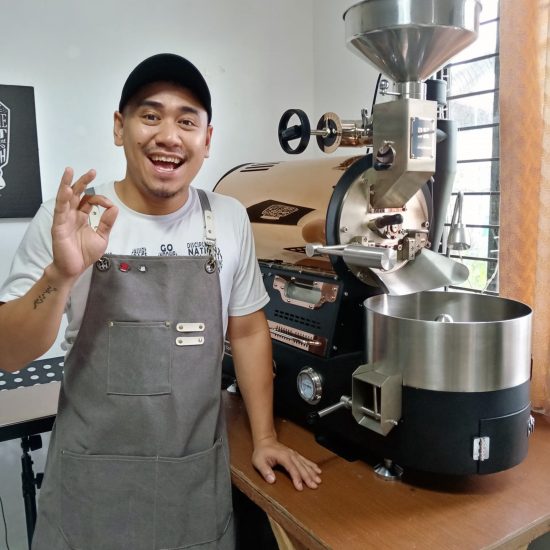
Sinag’s roaster Paul Bañas (he/him) brought attention to the multiple challenges their farmers are facing, and how the roastery is supporting them along the way. “The main challenge our farmers are facing is a lack of processing facilities and machinery to help them improve the quality of their coffee,” he stated. “Second, the road from farm to market is very challenging—farmers need to cross rivers, climb mountains, and trek across muddy trails just to deliver (their crops) to the market.”
Paul went on to present a series of ways to address these challenges: “Educating and empowering (the farmers) about financial management and the best farming, harvesting, and processing practices won’t just have a huge impact on the coffee’s quality, flavor, and pricing—it will secure stability for the farmers’ families. Sinag also encourages an open link between farmer, roaster, and consumer; (those open relationships) help us maintain the quality and consistency of the coffee we’re producing.”
When asked why coffee is a powerful outlet for empowering Mindoro’s locals and the Philippines’ community as a whole, Paul responded, “The Philippines is one of few countries that produces 4 types of coffee—Arabica, Robusta, Excelsa, and Liberica—and we have vast areas of land where we can plant. If our farmers hone their passion and ability to produce quality coffee, the future will be brighter, and our cups will be filled with hope.”
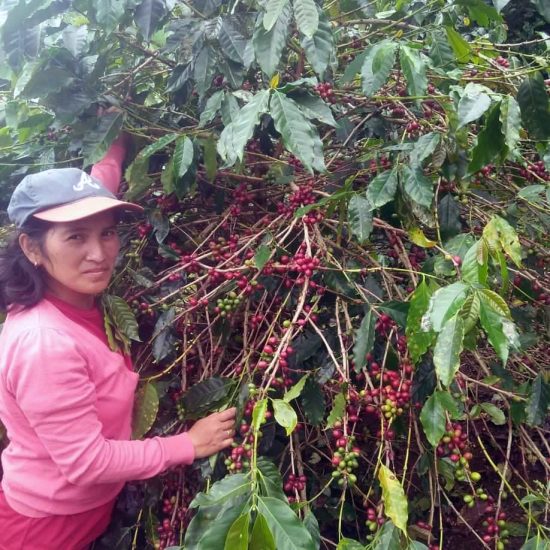
“We all agree that drinking coffee brings out this positive vibe in us,” Paul continued. “Whenever we take a sip, we know that everything’s going to be alright—that we can face the day with confidence, strength, and hope. This is also true to our farmers; they’re waiting for the day when they can tell themselves that their labor, time, and sacrifices have all been worth it.”
Paul’s words evoke the sinag the coffee company is named for: the ray of sunlight that leads the Philippines’ coffee growers through each and every storm. There’s a reason why the sun sits proudly on the Philippines’ flag; It’s an emblem of the country’s untouchable sense of hope—a reminder that, even after the hardest rainfall, there’s always a brighter tomorrow.

ABOUT THE AUTHOR
Based in Los Angeles, Emily Joy Meneses (she/her) is a writer and musician passionate about culture and collective care. You can regularly find her at Echo Park Lake, drinking a cortado and journaling about astrology, art, Animal Crossing, and her dreams. Explore her poetry, short stories, and soundscapes on her website.

